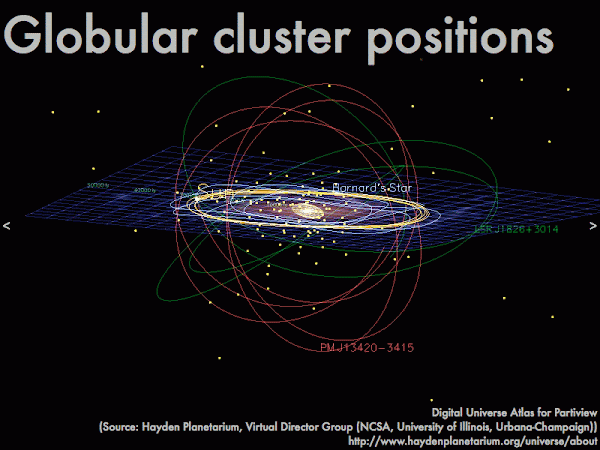Cuesta College, San Luis Obispo, CA
Students have a weekly online reading assignment (hosted by SurveyMonkey.com), where they answer questions based on reading their textbook, material covered in previous lectures, opinion questions, and/or asking (anonymous) questions or making (anonymous) comments. Full credit is given for completing the online reading assignment before next week's lecture, regardless if whether their answers are correct/incorrect. Selected results/questions/comments are addressed by the instructor at the start of the following lecture.
The following questions were asked on reading textbook chapters and previewing presentations on the Milky Way's shape, size and composition and spiral arm structure and formation.

Selected/edited responses are given below.
Describe something you found interesting from the assigned textbook reading or presentation preview, and explain why this was personally interesting for you.
"That stars change in various ways throughout time and many variable stars pulsate like beating hearts."
"Dark matter--it's a cool way to explain how objects in the Milky Way behave, even though we have little idea what dark matter is made of."
"That our sun has traveled around our galaxy plenty of times. crazy to think that the sun revolves around the galaxy."
"The shape of the Milky Way galaxy, as I never really thought of being anything other than just a stream of stars."
"Dark matter is quite interesting. It's especially fascinating since we don't really know what it's made of."
"It was interesting to learn about spiral arms in comparison of a starfish of a Milky Way and how they are not fixed structures but they keep 'growing back.'"
"How there are spiral arms and also spurs in the Milky Way. I thought it was just made up of multiple arms, not spurs or much else really."
"The Milky Way--I wish I could see it in real life instead of just in pictures. Although it also made me hungry. Curse the people that thought it would be a good idea to name chocolate bars after astronomy references. Now all of us astronomy students can't catch a break. "
Describe something you found confusing from the assigned textbook reading or presentation preview, and explain why this was personally confusing for you.
"How stars stop pulsating when they evolve out of the instability strip."
"The way the galaxy's spiral arm stars light up then get dark, and how dark matter works."
"There was nothing confusing about these presentations. Everything was pretty straightforward."
"I honestly didn't get the whole concept of globular cluster. I get that our galaxy has them but I don't know how to spot one."
"It will always confuse me that there is no end to space and how there are more and more galaxies outside of the Milky Way."
"I found the gravity and orbits part of the slides in your blog to be a little confusing. I don't understand the difference between 'centered' and 'spread-out' gravity."
"Why is this always the hardest part to fill out?"
In your experience, how much of the "Milky Way" (the band of faint stars across the celestial sphere) have you been able to see in the night sky?
As much as can be seen with the naked eye. ***** [5] Not very much. ****** [6] Barely seen it. *** [3] (Never been able to see it.) *** [3] (Unsure/guessing/lost/help!) [0]
Using the most powerful light-gathering optical telescopes in the darkest skies, __________ of the stars in our entire galaxy can be observed from Earth.
1%. ***** [5] 5%. ** [2] 10%. ********** [10] 50%. [0] 100%. [0] (Unsure/guessing/lost/help!) [0]
 If you did not have access to a mirror while camping, what could you do to find out whether or not you're having a bad hair day?
If you did not have access to a mirror while camping, what could you do to find out whether or not you're having a bad hair day?"I wouldn't care what condition my hair is in."
"I never have bad hair days. Just planned crazy hair days."
"You could ask your friend if your hair looks like a galaxy with spiral arms or an unremarkable blob-shaped galaxy."
"Look in the body of water around you or a pot or pan you have for cooking."
"Assuming my vehicle is there and for the sake of the question there are no mirrors on the car, I'd use the reflection off a window. Even if I had my phone but it was dead I could use the screen as a mirror to check."
"See if any of the other campers run away screaming, "Monster!" or "Cool! That bear has an afro!""
"Feel my hair, see if it's tangled, or poofy from humidity."
"I would look at my own shadow. I always have a bad hair day so wouldn't be surprised."
Look at PimpStar Rims (*.html) for cars, or MonkeyLectric Rims (*.html) for bikes. Briefly explain how they work.
"It flashes lights at intervals that we perceive at images as it moves, due to the speed we process optical stimulae."
"They use a computer to program LED bars to light up and create certain images as they spin."
"Parts of the rims light up at certain points, making it look as if there is one stationary object when it is just a moving circle of blinking lights."
Ask the instructor an anonymous question, or make a comment. Selected questions/comments may be discussed in class.
"When are we ever going to use the telescopes at night?" (Hopefully this week, weather permitting, and allowing time for the ground to dry out from the rain. I'll give you a heads-up on this on Thursday.)
"Do you have bad hair days?" (I accept the fact that bad hair days are better than having no hair at all. Still, that's what baseball caps are for.)
"Do you have MonkeyLectric Rims for your bike?" (Yes.)
"Is this Milky Way stuff going to be on the next midterm?" (No, the second midterm covers only up to stellar evolution. The midterm study guide has already been posted online.)
"Are we going to have a movie day in class and watch Zodiac?" (Nah, instead we'll use the "free day" next week to review for the midterm, and for an extra-credit group worksheet.)
"If it is speculated that there is a supermassive black hole at the center of most galaxies, how could gravity be spread out so evenly throughout the galaxy?" (Actually this is how we know that the "evenly spread out gravity" in galaxies cannot come from the central supermassive black hole, but instead from "evenly spread out" dark matter.)
"If the vast amount of matter in the Milky Way is 'dark matter,' is there dark matter in our solar system and near Earth?" (Astronomers are already looking for evidence of that right now.)
"Please go over and explain these presentations and reading from the textbook a little more extensively this week."
No comments:
Post a Comment